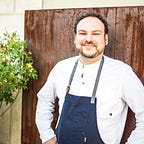Taming The Garden
This post actually originated as an email to a colleague I met during an online seminar hosted by Cooks for Black Lives Matter. I thought, hell, it would be a pretty good introductory post about my business and why Austin, Texas is the prime location for food justice work. A little bit about me…
My name is Marc Chirico. I initially moved to Austin to work in music after getting a BA in music business at Belmont University. I ended up getting part time jobs working with food to supplement income and sort of fell in love with the process of cooking. That — plus a total fanboy level obsession with “No Reservations” on the Travel Channel — compounded an interest in a career in cooking food. The fact that I wasn’t making much money doing music led me to culinary school, and after graduating I worked in a lot of different facets of the industry: fine dining, food trucks, catering, bakeries, hotels, concessions, etc.
I’ve always been the kind of person that wanted to start my own business as a way of bringing the community together for the greater good. The intersectional nature of food justice work allows me to not only do what I love but do it in a way that empowers and does good for others in the process.
I started my company in late 2019 as a catering company and found some success before the pandemic catering small parties and weddings. However, I’ve always been uncomfortable with the elitist nature of fine dining and its inaccessibility to marginalized communities. My eyes were opened to more equitable, sustainable business models within the framework of food justice. By posing creative problems to the inefficiencies of traditional food businesses, inequities can be resolved within marginalized, food insecure communities. By working to fix the root causes of systemic racism and environmental inequities, the greater evils of the food industry can be reversed.
Austin is poised to be the perfect place for such work since it has a unique and troubled history of racial bifurcation by way of “progressive” laws. Amid robust economic growth, there is abject poverty and flight among minorities in Austin. African Americans have lost population share in Austin every decade since 1920 and experienced a real decline from 2000 to 2010, even as the city as a whole grew by 20% during this same period. Austin is one of the few metropolitan regions in the United States with a higher percentage of African Americans in suburbs than in the central city — and poverty in Austin’s suburbs rose by 143% between 2000 and 2011, the second fastest increase in the United States. The city’s population as a whole had a poverty rate of around 23% in 2011, among which a majority are people of color. In some transitional neighborhoods, poverty is 2,000% greater among African Americans and Latinos than among whites. Because of institutional discrimination in the labor market and unequal educational opportunities, Latino and African American Austinites rarely had access to stable white-collar jobs and were instead regulated to blue-collar jobs. And a recent study demonstrates that the Austin metropolitan area has the highest level of economic segregation among all 350 U.S. metropolitan areas. Today, this same segment of the population, and the areas to which they were segregated, face the highest levels of food insecurity in Austin.
I’ll be opening a pizza stand at the Sustainable Food Center Farmers Market in downtown Austin in April. We will have to operate for profit initially in order to purchase ingredients, market our business, and pay for overhead. We’ll be dedicating the proceeds from a weekly seasonal pizza to local initiatives in Austin that are also fighting for food justice and/or community advancement. I want to reinvest our profits back into the business to eventually host pop-up dinners at community centers around Austin’s food insecure neighborhoods and on the local farms from which we’ll be buying our ingredients. We’ll also be using the proceeds from these pop-ups to reinvest in the community by creating a Community Food Trust. Our big goal right now is to expand our business with a food truck so we can physically access food insecure neighborhoods and offer low-cost meals to its inhabitants. We want to establish a Community Food Trust to purchase farm land, whose food will be distributed in CSA boxes, pre-made meals, and sold to local restaurants who incorporate food justice work into their business plans. I want the farm to be majority owned by an organization in Texas that is working toward food and land sovereignty for indigenous peoples. Community members will have priority access to the farm, and membership cost will be offered on a sliding scale. This farm will also have a community kitchen and event center for fundraisers, live music, pop-ups, collaborations, flea markets, and more.
Visit our website and sign up for our newsletter to stay up to date on our market days and pop-ups! You can help us acquire the resources we need to scale out by coming to see us and purchasing a pizza. More info to come as our first market day approaches!
